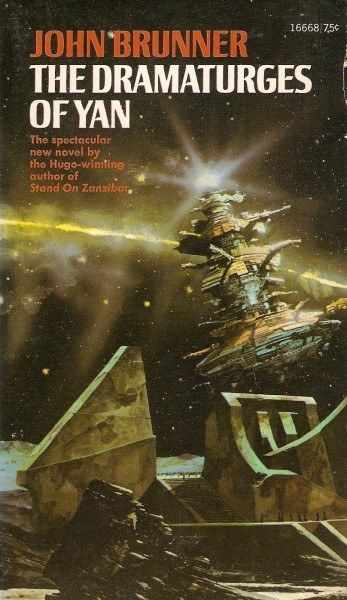Thank You For The Music
The Dramaturges of Yan
By John Brunner

9 Jun, 2019
John Brunner’s 1972 The Dramaturges of Yan is a standalone SF novel.
Humans have expanded throughout the galaxy like kudzu. What they find on Yan is … puzzling.
Yan is dotted with relics of an impressive lost civilization, one that ended in catastrophe. The moon shattered and turned into planet-circling rings; the descendants of the builders living diminished lives in the ruins. It’s not all clear why or how. All that is left are ruins and poetry, the Mutine Epics. The remaining Yanfolk have spent the last ten thousand years in cultural stasis. One year is like the next. Any changes are trivial. The human landing on Yan is the first new thing in millennia.
The Yanfolk are divided in their reactions to the human visitors. Some young Yan ape human ways, while conservative Yan view the disruptive humans with disdain and dislike.
A few (only three hundred) humans have permanently settled on Yan. Many of them have taken alien lovers. Most of them are the sort of expats who, in another time, would have been sipping gin and tonics, despising the natives, and passing the time by seducing each other’s spouses. Not the sort of people who shape history, one would think.
Enter Gregory Chart, humanity’s greatest artist! Chart has visited every human world and if there is a thing as interstellar culture, he is the one who created it! At least, so Gregory Chart claims and if you cannot trust humanity’s greatest artist, whom can you trust?
Chart is not here to entertain Yan’s humans. It is the Yanfolk who have engaged his services. He will recreate the fall of the builders! He will put on a show at which the whole galaxy will marvel!
Chart is basing his work on a translation of the Mutine Epics. The translator, Marc Simon, has gone native and is regarded (by the other expats) as damaged and unreliable. As is Morag Feng, another expat helping chart. The expats are sure that the show will be a disaster.
The human enclave complains to Earth about Chart’s activities. Earth sends an investigator. The investigator is armed with access to a vast information gathering and sharing network (possibly an extrapolation from ARPANET). The investigator discovers that the Yanfolk are not nearly as human as their bodies have led the expats to believe. Under the right conditions, they could combine to become something like a god.
Chart is about to wake that sleeping god.
~oOo~
There aren’t many Disco Era books that anticipate the net and the web. The Dramaturges of Yan is one of them. Brunner imagines human worlds in which all knowledge is accessible to anyone with the right equipment and the inclination to look. Brunner has also predicted (uncannily so) that making knowledge available isn’t enough. One has to know that there’s knowledge to be had and expend the effort to search for it. Something the humans on Yan have never done.
This novel dates from a period in which Brunner was writing classics like Stand on Zanzibar, The Sheep Look Up, and Shockwave Rider. Readers may be expecting something as ambitious and accomplished as those novels. Well … this was also period in which Brunner was writing less notable novels like Bedlam Planet, Timescoop, The Wrong End of Time, The Stardroppers, and The Stone That Never Came Down. With the exception of a one five-year hole in Brunner’s career1, he was a prolific author. His work ranged from impressive to dreadful.
This novel is, I am sad to say, close to dreadful (but without the careless energy of his early pulp material). The human characters are sketches (for the most part), the pacing is uneven, and the ending is abrupt and unsatisfying. I read it in the 1970s and never revisited it. Now I remember why I forgot it.
I think something could have been made of the setting and plot, but Brunner dashed it off and went on. Pity.
The Dramaturges of Yan is available here (Amazon), here (Amazon) and here (Chapters-Indigo).
1: Brunner spent from about 1975 to 1980 writing a historical novel called The Great Steamboat Race (1983). If it had been a hit, he might have been the next John Jakes. As it turned out, George R. R. Martin also wrote a steamboat novel. Martin’s Fevre Dream was based on the same it-really-happened race, but with extra added vampires. It also came out first. Brunner’s novel cratered on release. Not because Martin’s novel got all the reader love, I should add; it cratered too. It just wasn’t steam-engine time.
